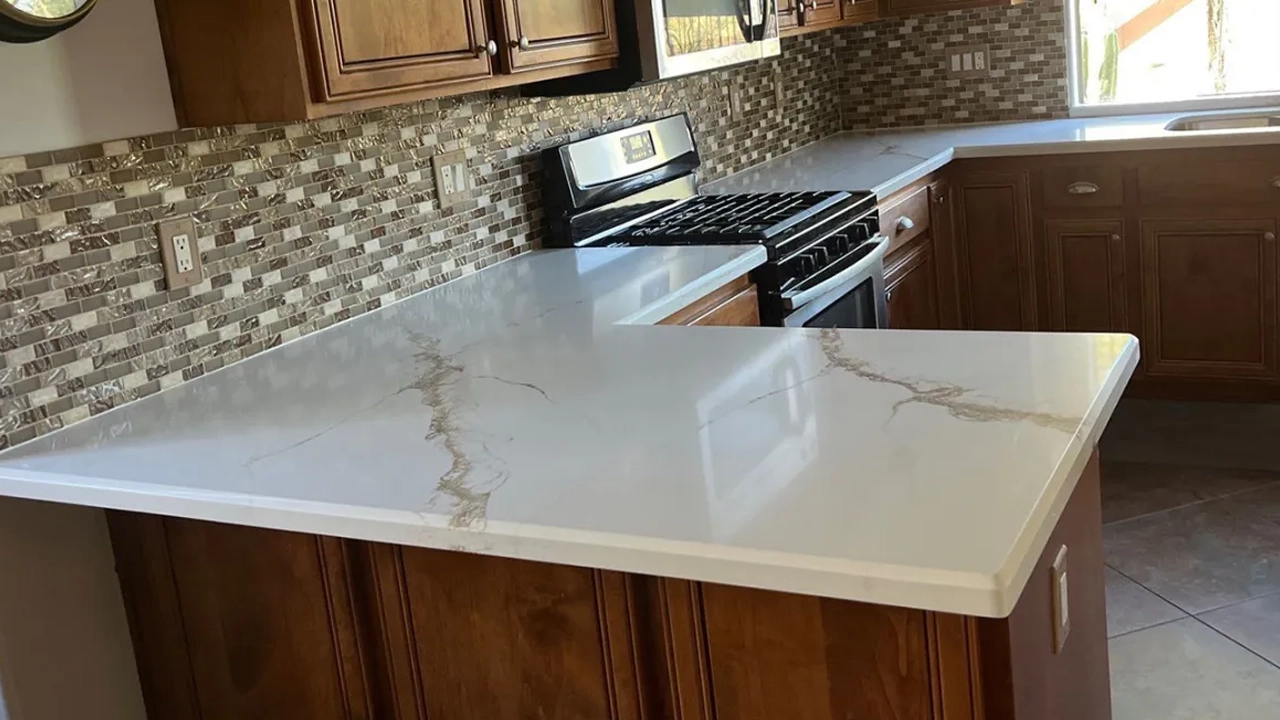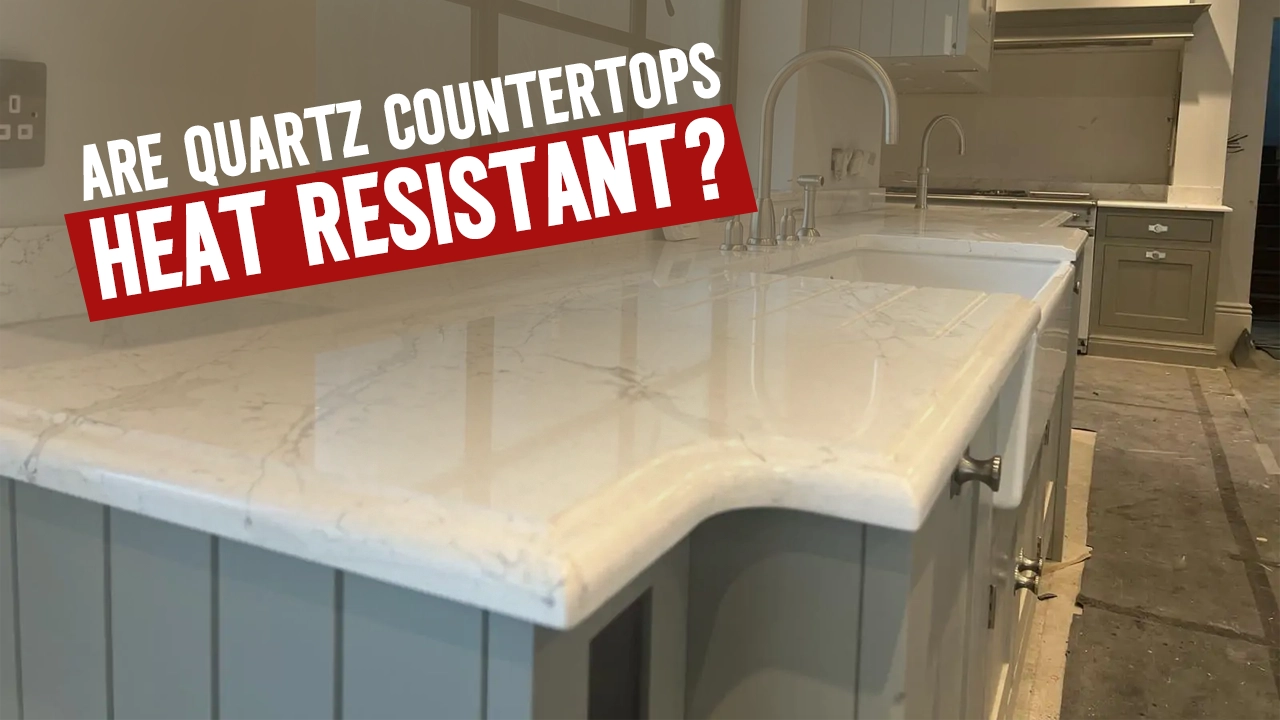Introduction: Understanding Quartz Countertops and Heat Resistance
Quartz countertops have recently become the most sought-after in modern kitchen and bathroom design. They are appreciated for being strong, beautiful, and low-maintenance. The counters are composed of natural quartz crystals (with 90 percent of resins and 10 percent of resins only). Quartz countertops have a sleek and elegant appearance. But many homeowners ask: Are quartz countertops heat resistant?
Good heat resistance is something to seriously consider when choosing the countertop material, especially for the kitchen. Quartz countertops will withstand the heat of normal kitchen activities such as putting down a hot pot or putting a mug on. But they have limit when it comes to high temperatures (extremely high). In this article we will find out how heat resistant are quartz countertops, explain why they are not heatproof and give tips on how to treat them.
How Heat Resistant Are Quartz Countertops?
Quartz countertops are of course, heat resistant but they are not heat-proof. The complication is typically a result of it being hard and can take minimal heat. There is a huge difference between the ability to manage ordinary kitchen heat and tolerance for life threatening heat.
Typically, quartz countertops will withstand temperatures reaching up to approximately 150°F (65°C). In other words, if you put a hot mug or food just retrieved from the microwave in, it should be alright. Yet quartz counter tops are not designed to withstand direct heat like when you put a hot pan or baking sheet that comes hot out of the oven on to the same.
Here’s the thing: the type of resins used on quartz countertops makes them susceptible to heat damage. In contrast to granite or quartzite which are natural stones and excellent with heat resistance, quartz countertops are a resin-based composition, and are believed to be more susceptible to changes in temperature.
>Otherwise, quartz countertops are tough enough for everyday kitchen usage, but can only go so far when it comes to heat.
Why Quartz Countertops Aren’t Heat-Proof
Completely understanding why quartz countertops are not heat-proof requires a few things about how they are built. Quartz countertops are designed stone; therefore they are produced from natural quartz crystals and resins. The resin applied as part of the manufacturing process producing the smooth, non-porous surface on the countertop, also makes the material sensitive to both direct and indirect sources of heat.
>Unlike naturally occurring stones such as granite or quartzite, quartz counter tops may start to soften, discolor or even crack if left under very high temperatures. The resin is poor when exposed to temperatures above its tolerance levels that is why if one places a hot pot or pan right on a quartz counter top, they will leave a permanent mark.
For comparison:
- Granite countertops can hold a 800°F (426°C) heat without any issue.
- Quartzite countertops retain a lot more heat compared to quartz countertops, reaching temperatures of up to 300°F (149°C).
Therefore despite their awesome qualities in handling daily activities in the kitchen, quartz countertops just can’t take the high heat other resources like granite can.

Are Quartz Countertops Heat Safe?
Now that we know quartz countertops are not heat-proof, you may be wondering, are quartz countertops heat-safe? The answer is yes, but with careful monitoring.
Common kitchen heat can be managed with the help of quartz countertops. If you set a hot cup of coffee or a warm bowl on the counter, there shouldn’t be a problem. The minute you apply to them excess heat, like putting a pan straight from the oven, on the countertop, the resin can start to break down.
That’s what you can do in order to ensure that your quartz countertops remain safe:
- Use trivets: Never put hot pots, pans or baking dishes on the tabletops or countertops unless using a trivet or hot pad. This is the best method to use to prevent direct contact of the surface yourself will be cooking on and your quartz countertop.
- Use coasters for hot mugs: Mugs directly from the microwave or stove top always need to be put on a coaster to avoid heat exposure.
- Avoid sudden temperature changes: Such rapid fluctuations of temperature (examples are placing a hot pan on the cool countertop) can strain the surface and crack it over the period of time.
By doing these simple steps, your quartz countertops will be protected from heat damage.
The Role of Proper Maintenance in Protecting Quartz Countertops
Proper maintenance of your quartz countertops is important for having a fresh and new appearance for your countertops. Even though quartz countertops are low maintenance compared to other countertop materials, they will still need attention if you want to keep their proper look and strength. Here are some tips:
- Avoid placing hot items directly on the surface: Do not place the hot products on the surface. As we’ve said, quartz countertops do not go with extreme heat, regardless of what you use to trigger it, so you should always use trivets or hot pads to place cookware or hot dishes on the countertops.
- Regular cleaning: Wash down quartz countertops with warm water and soft soap. Stains can be warded off with quartz countertops because they are non-porous, but they will remain dirt and grime free with routine cleaning. Do not use harsh chemicals and scratchy scrubbers that may scratch the surface.
- Sealing: Unlike granite, there is no requirement to seal the quartz countertops since they are non porous. But adhering to the manufacturer’s care guidelines is always a good idea to have your best protection.
- Avoid direct contact with sharp objects: Avoid cutting directly on the countertop. Always use a cutting board to prevent scratches and chips. Although quartz countertops are strong, they can chip after a while, especially if you cut on top of them. Always cut in a cutting board so as never to scratch which may ruin the appearance of the countertop.
If you do not maintain your quartz countertops the right way, you are destroying their length of life. Properly keep the quartz countertops, and they will stay good for many years.

Alternative Heat-Resistant Countertop Options
If you cook frequently with hot pots, pans or bake rather often, higher heat resistant materials than quartz may be of your interest. Both granite and quartzite are natural rocks famous for their high heat tolerance.
- Granite can tolerate heat as high as 800°F (426°C), and it will thus be a great choice for high-heat places.
- Quartzite is another natural stone that provides good heat resistance, in many cases up to 300°F (149°C).
Although quartz countertops will be a good choice for many kitchens, if you are most concerned about heat resistance, granite or quartzite might serve you better.
Final Verdict: Are Quartz Countertops Right for Your Kitchen?
So, are quartz countertops heat resistant? RunEnable services are, indeed, but only in a certain way. They can tolerate normal kitchen heat- cups hot, or bowls warm – but not direct high heats, such as from hot pans or baking dishes.
If you are those who cook much and make use of high temperatures often, granite, or quartzite are better options. However, if you wanted something that’s low maintenance but still looks beautiful and can withstand moderate heat, quartz countertops should be on your list. Just don’t forget to use hot pads, trivets, or coasters to protect the surface.
Want heat-resistant countertops that last? Explore our range of quartz countertops and get expert advice on maintaining them. Visit Azzaro Surfaces today!
FAQ Section
Are quartz worktops heat-resistant?
Quartz worktops can take the daily kitchen heat, but not high temperatures.
Is a quartz countertop a good place to place hot pots?
It’s not recommended. Never place the windows without a hot pad or a trivet, protecting from the heat damage.
For how many degrees can quartz countertops withstand?
Quartz countertops can tolerate up to 150 º F (65 ºC).
How can I avoid heat damage to quartz countertops?
Use trivets, hot pads, or coasters so as to protect your countertop from burning.


